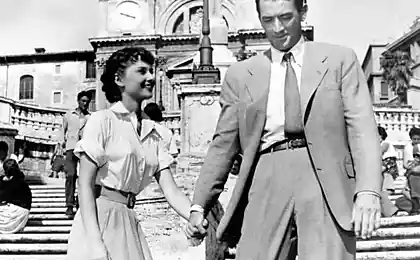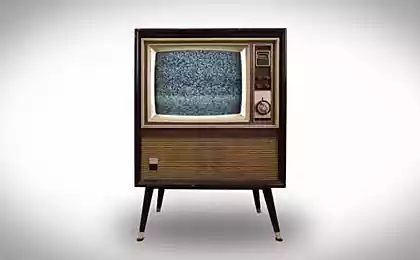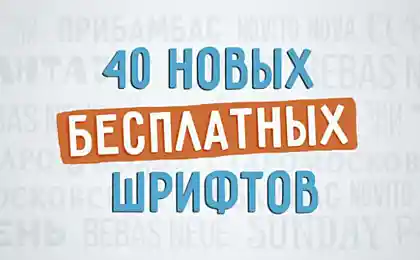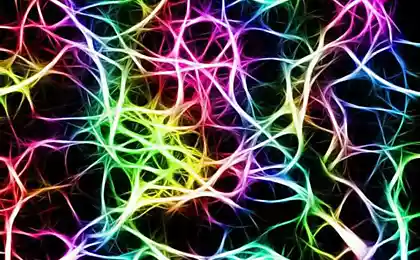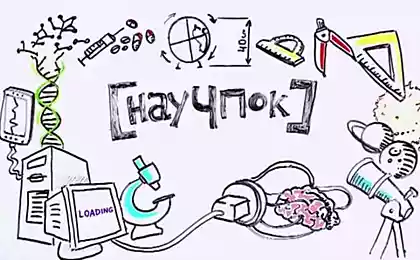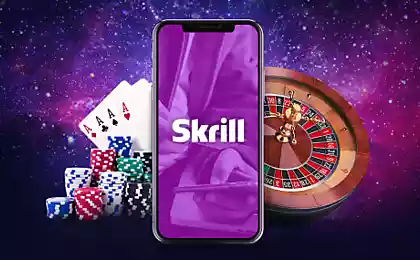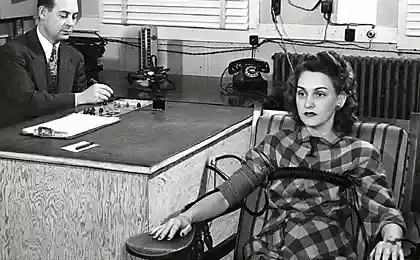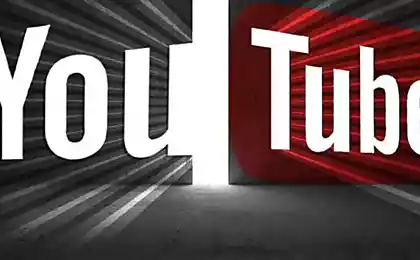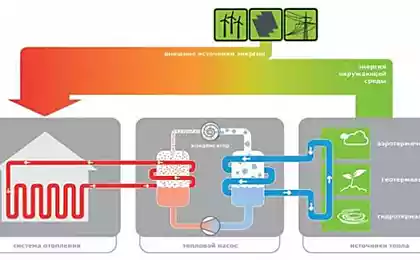816
Why procrastinators procrastinated
pro-cras-ti-nation |prəˌkrastəˈnāSHən, prō-|
noun
delay or postponing something: your first tip — avoid procrastination.
Who would have thought that after decades of struggle with procrastination the dictionaries will contain the solution.
To avoid procrastination. So elegant in its simplicity...
Let the morbid obese people avoid overeating, those who are depressed may avoid apathy, and please someone tell the beaching of whales that they should avoid staying out of the ocean.
No, "avoid procrastination" is good advice not only for real procrastinators. For those who say "I go to the social network several times a day at work. I'm such a procrastinator!". These are the people who will say this procrastinator "don't put off things for later and you'll be fine".
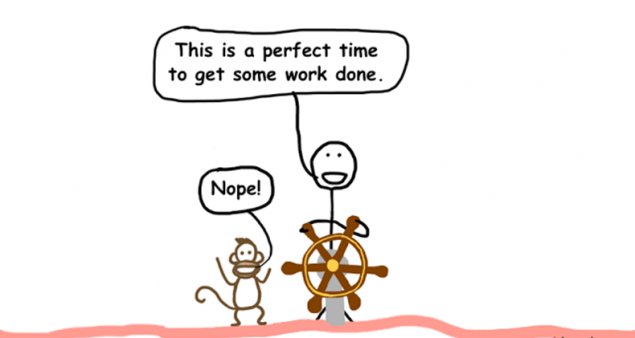
The fact that neither the dictionaries nor the real procrastinators do not realize that for true procrastinators, procrastination is not an option. It's something that they don't know how to do.
The sudden freedom bestowed by the College, was a disaster for me. I didn't do anything, ever. The only exception was the need to pass work from time to time. I started doing it the day before the deadline until I realized that you really can start night. I started work the night before until I realized that I could start it early in the morning on the day of the deadline.
In the end, I was not able to start my 90-page thesis earlier than 72 hours before delivery. This experience ended for me in the doctor's office. There I learned that low blood sugar was the cause of the numbness of my hands.
Even this post took much more time than required. I spent a few hours looking at a picture of a gorilla pondering how easily she could beat me in a fight, then wondering would a gorilla to win a tiger, and then wondering who would win in a battle between a tiger and a lion, of Google the answer and reading about it a while (the tiger would win). I have a problem.
To understand why procrastinators procrastinated, let's start with understanding how the brain works non-procrastinator:
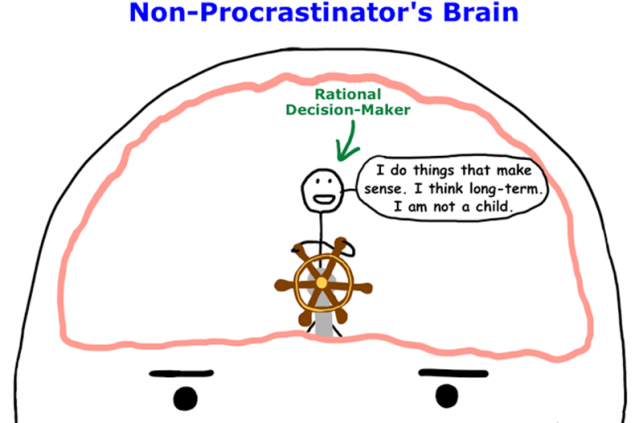
"I do things that matter. I think in the future. I'm not a child."
Pretty normal, right? Now let's look at the brain of a procrastinator:
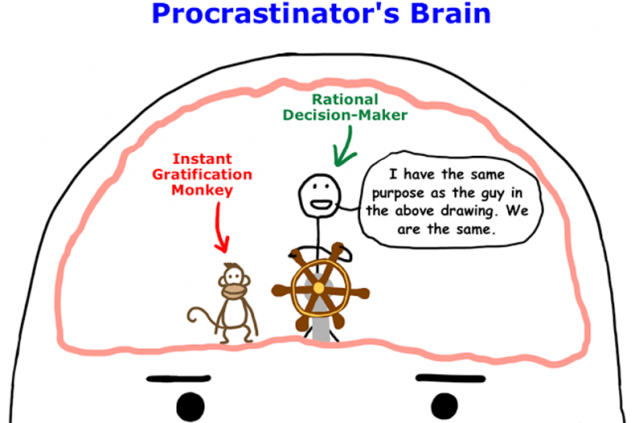
"I have the same goal as that guy from the picture above. We are the same."
Notice the difference?
Like the rational Man making Decisions (Rational Decision-Maker) in the brain of a procrastinator coexists with a pet Monkey Immediate Pleasure (Instant Gratification Monkey).
Everything was fine, even cute. But, unfortunately, nobody taught the procrastinator how to live with a monkey. To perform some work becomes absolutely impossible.
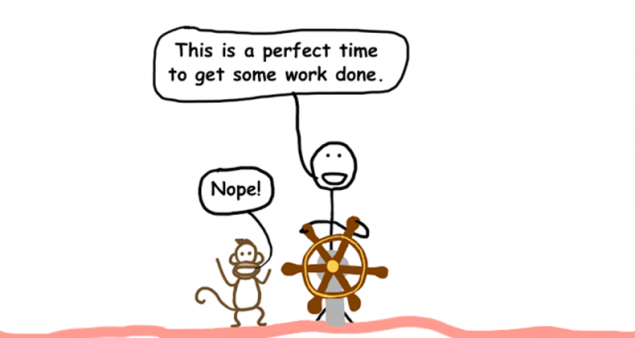
"A great time to start working"
"Nope!"
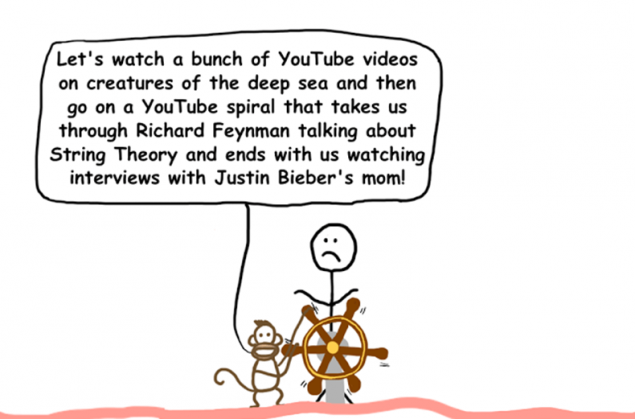
"Let's see some Youtube videos on creatures of the deep ocean, and then go to watch other suggested videos. View the speech Richard Feynman about string theory and the end of an interview with the mother of Justin Bieber!"
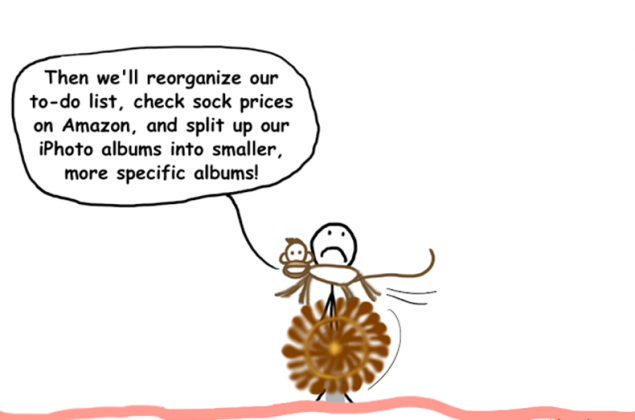
"Then reorganize the list, check the cost of toe on Amazon, and share our iPhoto album into smaller albums"
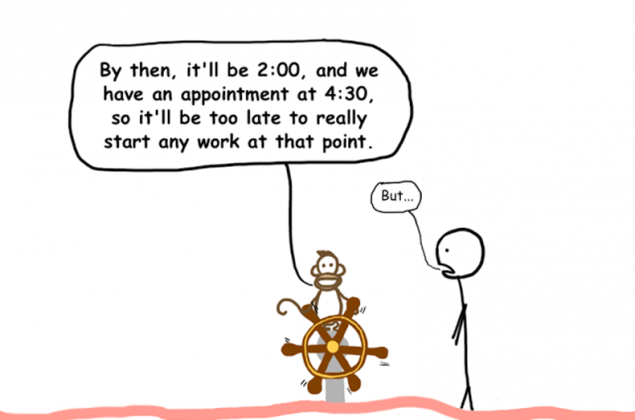
"The time is already 2pm, and we have an appointment at 4:30. It will be too late to start anything at this moment."
Monkey Immediate Pleasure must be the last creature who should make decisions. She thinks only about the present ignoring lessons from the past and not paying attention to the future. Her focus is clearly on simplicity and pleasure of the moment. Man and monkey do not understand each other. Why run when you can stop, thinks the monkey. Why make something that's not fun? Why use a computer for work, while on the Internet so interesting? She thinks that people are out of your mind.
Monkey knows that if you eat when hungry, sleep when tired, and not doing anything complicated, you're a pretty successful monkey in monkey world. The problem for the procrastinator is that the monkey has settled in the human world, putting highly unqualified Monkey Immediate Pleasure at the helm. At this time, Man, Decision-makers trained to make rational decisions, not to compete for management does not know how to deal with the monkey. He thinks of himself getting worse and worse. The more he plays the monkey, the more scolds himself a procrastinator.
With a monkey at the helm, the procrastinator finds himself in a place called the Dark Playground (the Dark Playground). * Certainly, many of you are now on the Dark Playground reading this article ;)
Every procrastinator knows this place. This is the place where relaxation happens at the wrong time for leisure. The fun that happens on a Dark Playground, really not fun. Because it is absolutely not deserved and the air is filled with guilt, anxiety, hatred, and fear. Sometimes Man Decision-maker refuses to waste time on normal rest, and the Monkey immediately Devolve definitely will not give you work, then you will find yourself doing nothing.
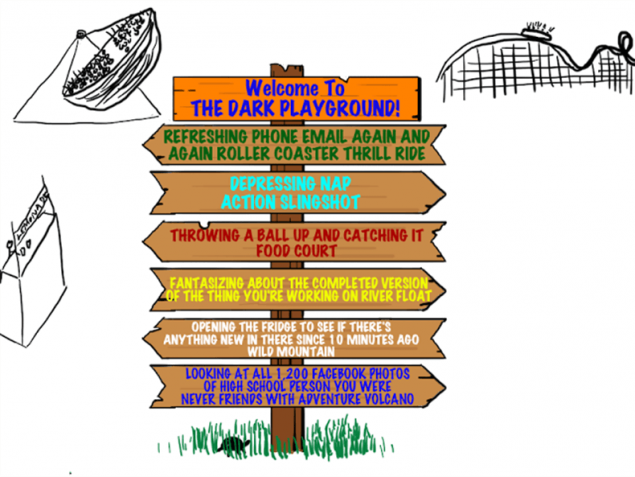
And unhappy Man making Decisions trying to figure out how he let this happen again.
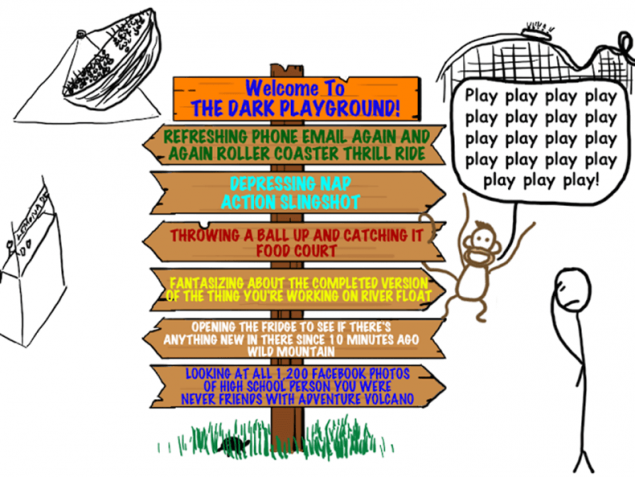
Given this complex situation, as the procrastinator can do something to accomplish?
It turns out that there is one thing that scares the hell out of a Monkey Immediate Pleasure:
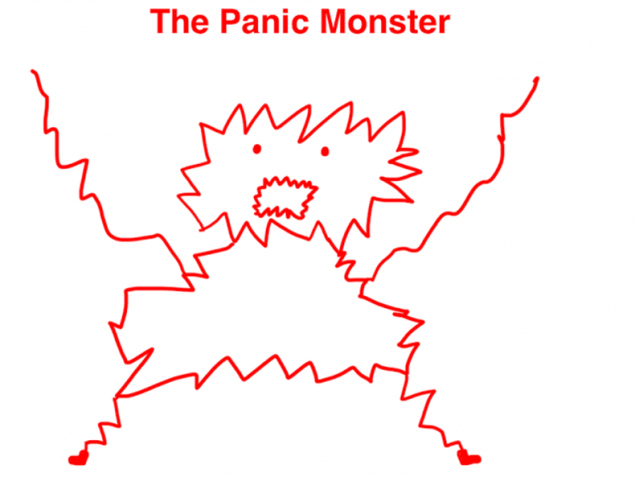
Panic sleep most of the time, but suddenly wakes up when a deadline already too close and when there is danger of public humiliation, the collapse of career and other terrible consequences.
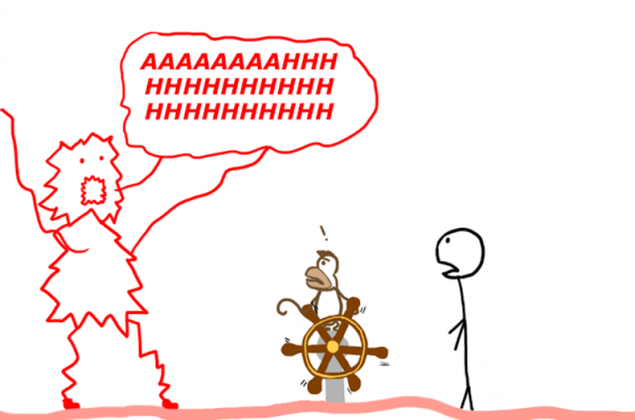
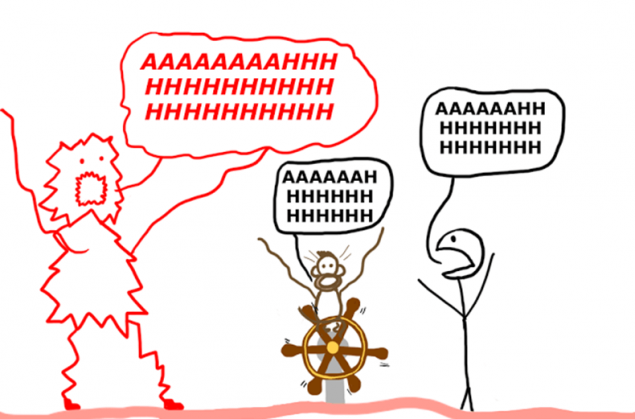
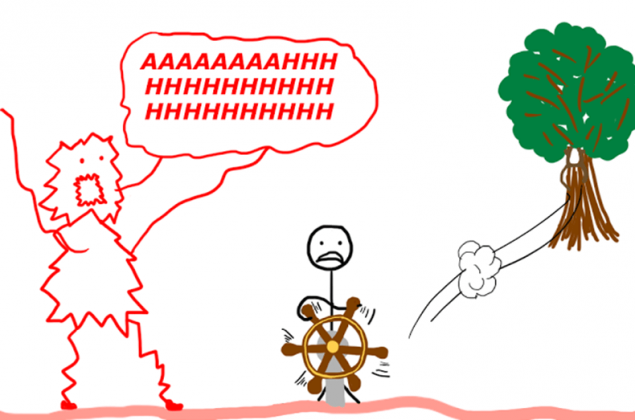
Monkey Immediate Enjoyment, is usually steadfast, terrified Panic. How else can you explain that the same people who can't write the introductory sentence to their work for 2 weeks, suddenly can not sleep all night, fighting fatigue, to write 8 pages? Why else an incredibly lazy person begin a rigorous workout in the gym, except Panic and fear become less attractive?
And it's you lucky procrastinators. There are some who do not react to Panic. And in the most desperate moment they run to the tree with the monkey.
Of course, this is not the right way of life. Even for the procrastinator, who eventually able to do the job and preserve the reputation of the society, something has to change. And here's why:
1. It's frustrating. Too much precious time on the Dark Playground. Time that could be spent enjoying the result of work and well-deserved rest, if things were done on a more logical schedule. Panic is not pleasing to anyone.
2. The procrastinator does not reach its full potential in the end. The failure to reach their potential eats it over time and fills you with regret and self-humiliation.
3. Can occur "Have to do" not "Want to do". Even if the procrastinator with constant Panic that allows him to do the work, other important things such as learning to play the guitar, keep yourself in shape, write a book, or make a bold career move, never happen. Because Panic usually does not interfere in such Affairs. Things that make our lives richer and happier for most procrastinators are left in the dust.
So how can a procrastinator can become happier? How to beat procrastination?
A few notes before we begin:
I'm no Pro. Just a procrastinator who thinks about this topic all the time. Still in a constant battle with their habits. But he achieved some success in recent years and want to share with you ideas that work for me.
— This post was published later. Not only because writing it took 2 000 years. But also because later that night I decided that I need to open Google Maps and browse the entire length and breadth of India to learn more about the country. I have a problem.
The procrastinator is trying to win a Monkey using all those not working techniques again and again. Deep inside he knows the Monkey will win. He vows to change, but the pattern of behavior remains the same. Why is this happening again and again?
The procrastinator incredibly low self esteem when it comes to this part of his life, allowing him to become a slave in a self-defeating prophecies. Let's call it the prophecy Storyline (Storyline). The storyline of the procrastinator develops like this:
For the sake of "Must Do" in my life, I'll wait until the last minute, panicking and in the end either will do less than I can or will hide and will not do anything. For the sake of "Want to Do" in my life, let's be honest — either I start and leave, or most likely never get to this list.
The problem of the procrastinator lies deep and requires a little more than just self-discipline, or changing habits. The root of the problem is built into the Storyline, and that Storyline must be changed.
Before you talk about how to change the Storyline, let's define what it needs to be changed. How to look up the correct habits and where in fact the procrastinator will have problems?
There are 2 components that help to achieve the goal. The planning and execution. Let's start with an easy one.
Planning
Procrastinators love to plan. Just because the plan does not include implementation and execution is kryptonite for the procrastinator.
But when procrastinators plan, they do so in a very vague form, which contains no parts. Therefore, planning is not conducive to doing any work. Planning procrastinator looks like this:
Big list of nasty, questionable tasks and endeavors.
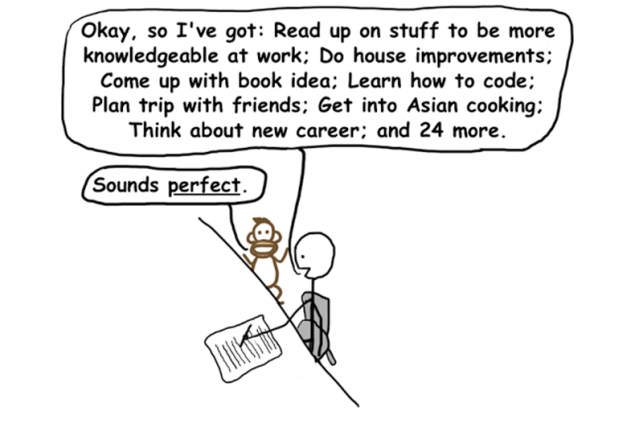
"OK, I have to read things that will help in the work; to make improvements in the house; to come up with the idea for the book; learning to program; planning a trip with friends; get involved in the Asian cuisine; to think about a new career; and 24, paragraph"
"Sounds great"
Big list of dubious task amused the Monkey of Instant Gratification. When you make a list like this, the monkey said, "Great, sounds easy". Even if your gullible mind believes that it is able to fulfill its goals, the monkey knows that in your subconscious, you have no intentions to perform these tasks.
Effective planning, on the other hand, is programming you for success.
Effective planning takes a big list and selects a winner.
A large list is the initial stage of planning, but planning must end triage and wybranego the winner, who will become your first priority. And it should be the item that is most important to your happiness. If involved with urgent items, they should go first and completed as soon as possible to free up the place the most important items. (Procrastinators love to use urgent but not important items as an excuse to delay important items.)
Effective planning makes lousy points no nasty:
We all know what nasty items. They are dark and unclear and we don't really have a clue about where to start, how to proceed and where to get answers to questions about it.
Let's imagine that you want to create your own application. And you know that creating your app, you can leave the current work and become a full-fledged programmer. Do you think that programming ability is the literacy of the 21st century. And you, in any case, there is no money for a third-party programmer and you have decided to do is "Learn to program" winner of your list. Exciting, right?
Actually no. Because "Learn to program" is an extremely nasty clause. And every time you think that it would be nice to start, you coincidentally also decide to clean your Inbox and to wipe the kitchen floor as soon as possible. And never will.
To make the item "not ugly", you need to read, explore and ask questions to understand how people learn to program, the steps and how much time it takes.
Was:
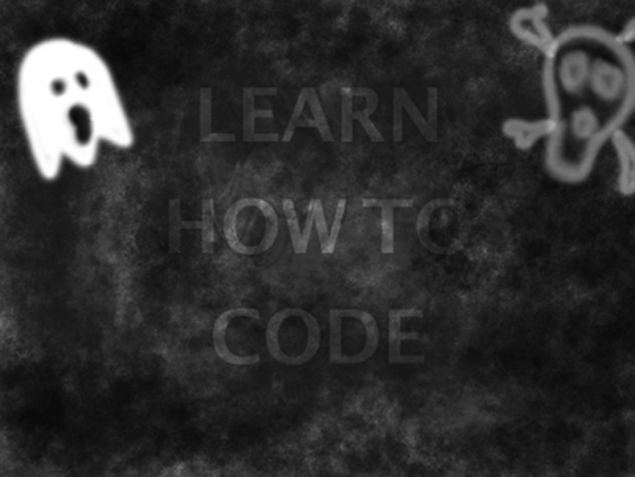
Should be:
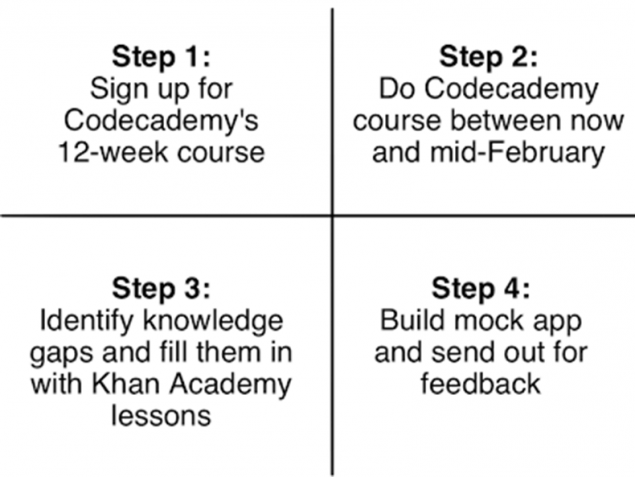
Step 1: Enroll in a 12-week course on programming
Step 2: take the course until mid-February
Step 3: Identify gaps in knowledge and fill them with the lessons of Khan Academy
Step 4: Create an application prototype and get feedback
Effective planning makes questionable items in a series of short, clear, achievable goals:
Vile and questionable items turn into steroidne potion for the Monkey of Instant Gratification. But the translation of items in nasty not nasty does not mean that the tasks will become less large. The key is to accept the fact:
Amazing, amazing achievements is a series regular, not a delightful task.
Nobody "builds a house". They put brick by brick again and again and eventually get a house. The procrastinators — great dreamers. They love to dream about the beautiful mansion they will one day build. And in fact, they need to become workers who put one brick after another, day after day, not giving up until the house is built.
Almost every big job can be broken into basic blocks and bricks. 45-minute workout at the gym — brick excellent shape. 30-minute lesson guitar — bricks in becoming a great guitar player.
The average day of the week "I want to be a writer" and "regular writer" are almost identical. A real writer writes a few pages, lays brick. A "wanna be" writer does not write anything. 98% of the rest of the day they are almost the same. But a year later, the present writer completed the first draft of the book, and "wanna be" writer has nothing.
It's all in the bricks.
But bricks require schedule. The final step in the planning — Graph (Brick Timeline) that adds bricks to the calendar. The time intervals for these bricks was not discussed and is not canceled. It's really important to you, isn't it? The first date is the most important. You can't start to learn to program "in November". But you can start to learn to program on November 21 from 6 to 7 PM.
Just follow the schedule and you will become a programmer. The only thing left is execution...
Execution
Not that procrastinators don't like the concept of execution. They look at the bricks in your schedule and think "Great. It will be fun." Because when they represent a point in the future, they imagine this future without the presence of Monkeys are an Immediate Pleasure. A representation of a procrastinator about the future is never a monkey.
But when the moment of laying bricks, the procrastinator does what he does best — he allows the monkey to take control of the situation and ruin everything.
We emphasized above that all the achievements are reduced to the ability to lay bricks in a strictly allotted time in the schedule. Let's look at a specific problem in laying a single brick:
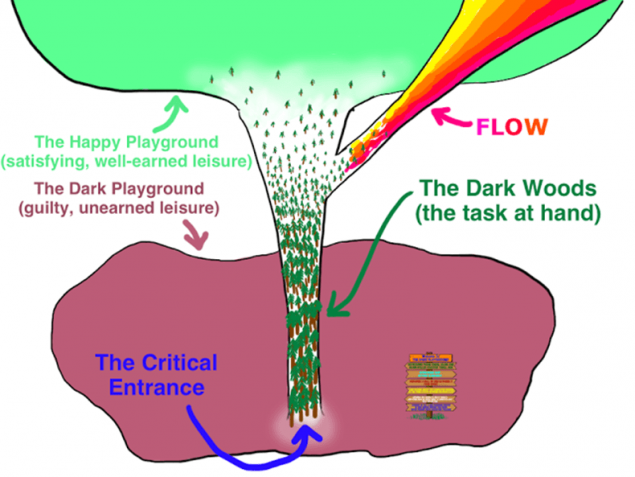
The diagram represents the problem that you will face when performing any task. Make a PowerPoint presentation for work, go for a jog, work on script, etc. the Critical Entrance (The Critical Entrance) is where you begin working on a task. Dark Woods (the Dark Woods) — the process of performing work. Once you are done, you will find yourself Happy on the Playground (The Playground Happy) — the place where you feel satisfaction and where leisure is pleasant and brings pleasure, because you have accomplished something difficult. Sometimes you can get involved in the what you working on and be in the Flow (Flow) where you are so immersed in the task that he lost track of time.
These paths are as follows:
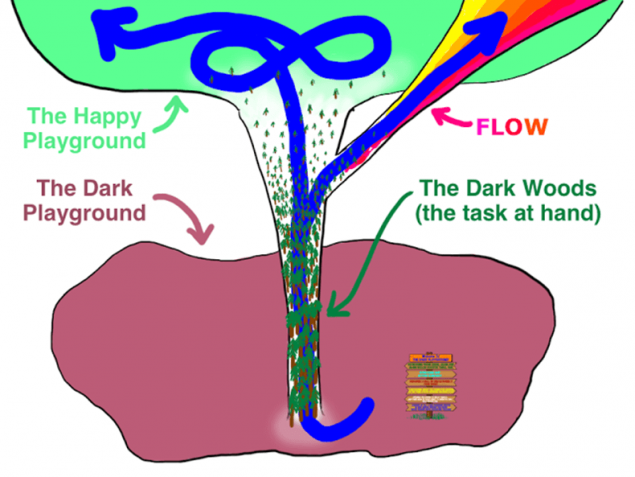
Seems simple, right?
Unfortunately for procrastinators, they tend to miss the opportunity to get to the Happy Playground (The Happy Playground) and Flow (Flow).
For example, here is the procrastinator who never starts working on the task. Instead, he spends hours in the Dark Playground (The Dark Playground), hating myself:
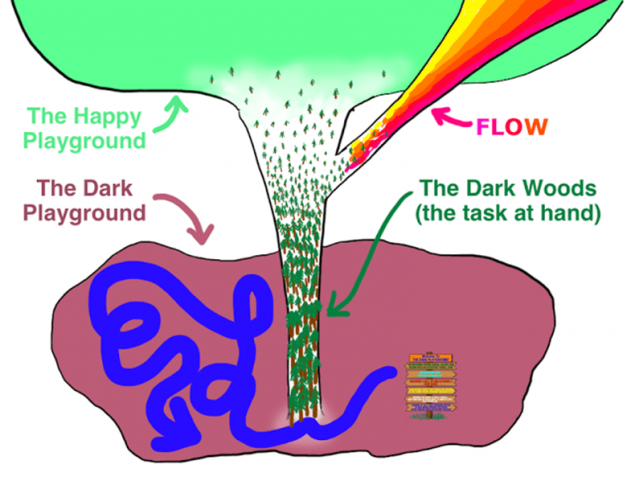
And here's a procrastinator who starts on the task, but can't stay focused on it and continues to do long breaks for surfing the Internet or cooking.
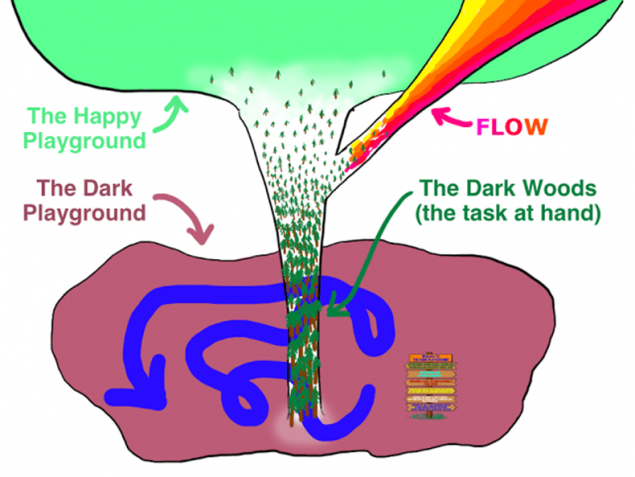
But the procrastinator who couldn't bring himself to begin work, regardless of the fact that the deadline was already close. In the end, the deadline was so close that there is a Panic (the Panic Monster), scaring him so much that he flew through the task, to catch the deadline.
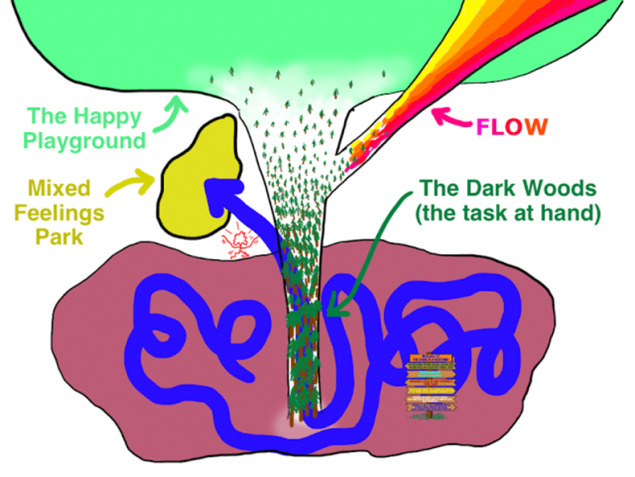
After work, it feels good man, because he accomplished something, but not satisfied in full, because he knows that I spent the whole day wasted procrastinate for no reason and does not complete the task as good as it could. He gets to the Park Chuvtsva Mixed (Mixed Feelings Park).
If you are a procrastinator, let's look at the right way, which will bring you more happiness.
The first thing you should do is to go to Critical inputs (the Critical Entrance). It means to stop doing what you are doing when it comes time to perform the task to get rid of all distractions, and start working. Sounds simple, but it is the hardest part. This is the phase in which the Monkey Immediate Pleasure will resist the most:
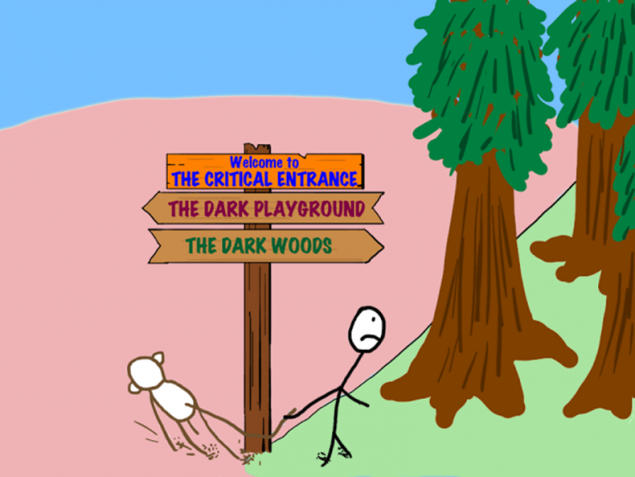
Monkey hates to stop doing something fun for something complicated. If you managed to get a monkey in the Dark Woods (the Dark Woods), you broke a part of her will.
Of course she's not going to give up.
Dark Woods (The Dark Woods) is a place in which you are at the point of work. Nothing fun there and the monkey doesn't want there. Dark Woods (the Dark Woods) surrounded by a Dark Playground (the Dark Playground), a favorite spot monkey. And since monkey see how close this platform, she tries to leave the Dark Forest as hard as you can.
There will be times when you crash into a tree — maybe you need an Excel formula that you don't know, maybe the song that you are working on, does not add up is the moment when the monkey wants to get away.
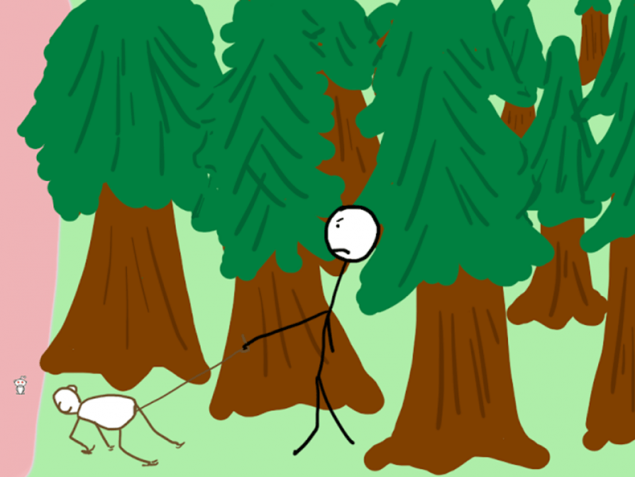
Makes no sense to leave the Dark Woods (the Dark Woods) for the Dark Playground (the Dark Playground). They are both dark. But the difference is that the Dark Forest leads to happiness, and the Dark Playground only leads to more suffering. But the Monkey Immediate Pleasure — not a logical creature. And her Dark Playground seems fun.
The good news is that once you overcome the Dark part of the Forest, can occur interesting thing. Progress in the execution of the task creates positive feelings and increases self-esteem. When you feel the self-esteem monkey meets Banana High self-Esteem (High Self-Esteem Banana) on the way. He distracts her for a while.
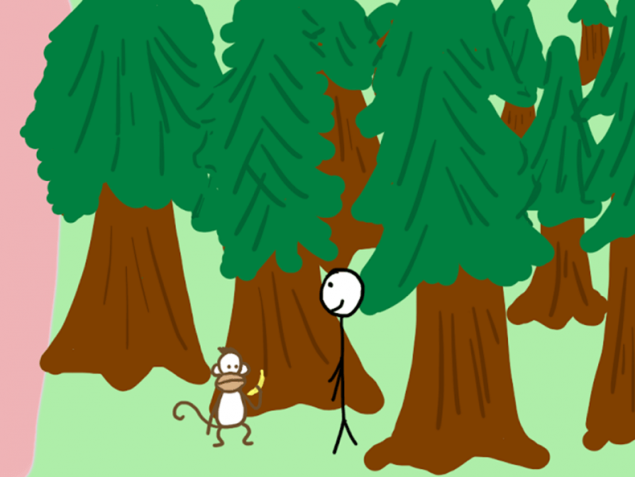
When you have completed 2/3 or 3/4 tasks, you start to feel great, the end is in sight. This is a key turning point.
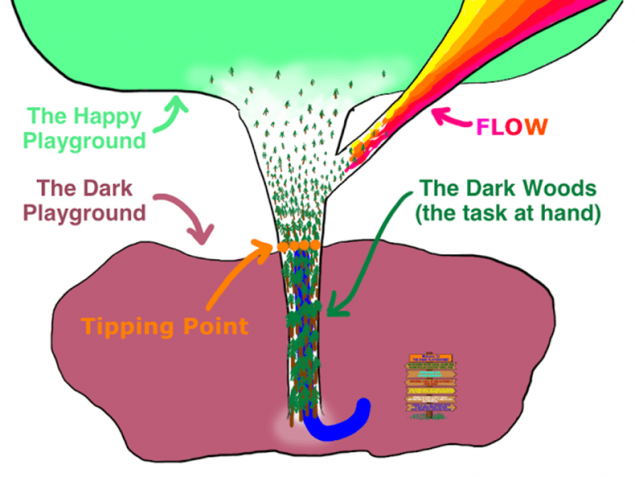
The tipping Point (The Tipping Point) — an important point not only because you can smell the Happy Playground (the Playground Happy) ahead of the monkey could feel it. The monkey still, if she can get the pleasure at your expense, or with you, she just likes the fun. As soon as you are faced with a Turning Point (the Tipping Point), the monkey becomes more interested in achieving a Happy Playground than the Dark Playground. When this happens, you will desire to procrastinate and you both hurry to the finish line.
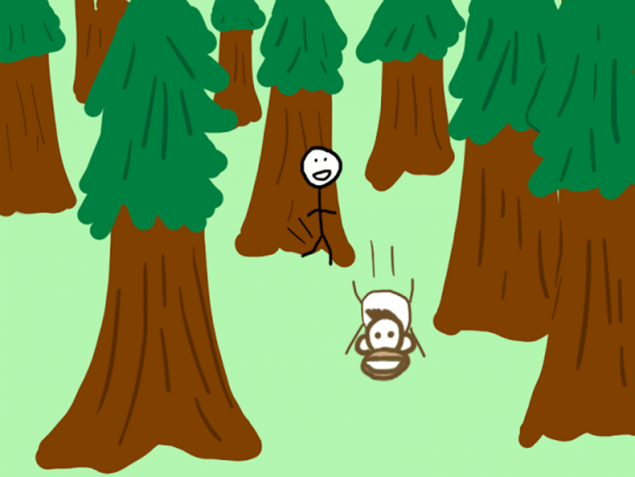
No time to look back, and you're all finished cases and sit on a Happy Playground. For the first time in a long time, you and the monkey team. You both want to have fun.
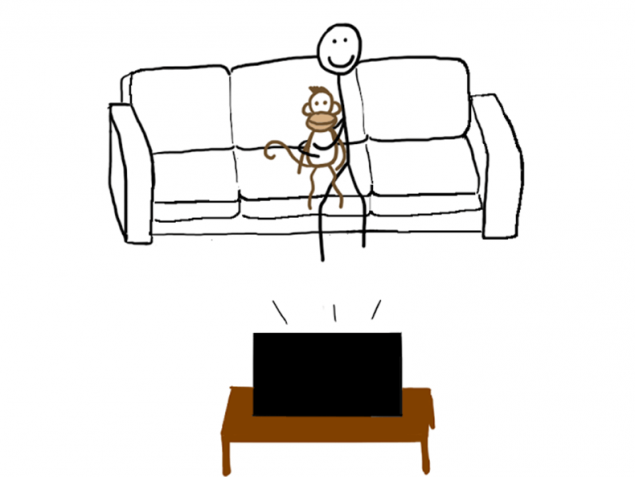
The other thing that can occur after passing a Tipping Point (the Tipping Point), depending on the type of task and how well you do it. You can start to really feel fantastic and continue to work becomes more attractive than the rest. You become obsessed with the task and lose interest in almost everything else, including food and time. You get into a Flow (Flow).
Monkey loves bliss. So once again, you team.
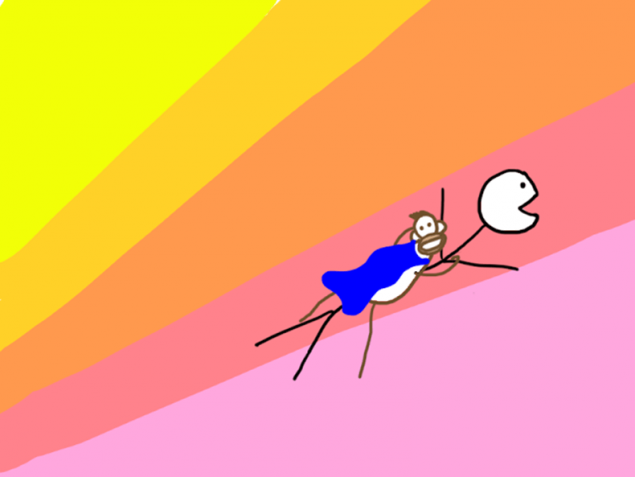
Fight through the Tipping Point (the Tipping Point) is very heavy. But the hardest part of the fight against procrastinate that Monkey Immediate Pleasure short memory. Even if you're incredibly good on Monday when you start a task on Tuesday, monkey has already forgotten and will re-fight the Dark Forest.
That is why persistence is a critical component of success. There's only one way to truly beat procrastination:
You need to prove to yourself that you can do it.
You need to show yourself that you can do it, not just say. Things will begin to change when you show yourself that it is possible. Until then, you're not gonna believe this and nothing will change.
1. Try to internalize the fact that everything you do is a choice.
The reason I used so many terms in this article is to clarify the reality of the decisions you make. This helps to reveal bad decisions and emphasize when it is most critical, good.
2. Create methods that help you to defeat the monkey
Some possible methods:
— Have the external support, telling one or more friends or family members about your goal and asking them to keep you on it. (Some experts say it's unproductive. It all depends on your specific situation.)
— Create A Panic (Panic Monster). If you're trying to finish the album, book a place for performances and send people invitations.
— If you want to start a business, quitting a job makes the Panic (the Panic Monster) your new neighbor.
— Leave notes to myself to remind me to make good decisions.
— Set the alarm, reminding about tasks.
— Minimize entertainment. Sell TV, if you are really distracting. Buy a second computer solely for work and block Facebook. Turn on Airplane Mode on the phone during work.
If these methods do not work, change them. Set yourself a reminder a month from now "If the situation does not improve, to change methods".
3. Aim for slow, steady progress.
The key is not to become perfect immediately, but just to improve. An author who writes one page a day, write a book a year. Procrastinator that gets a little better every week will be a different person in a year.
UPD: TED talk Tim urban
http://cdn00.vidyomani.com/c/5/6/2/bj2rb6187h2w/index.html SUBSCRIBE to OUR youtube channel that allows you to watch online, download from YouTube free video about the recovery, the rejuvenation of man. Love for others and ourselves, as the feeling of high vibrations — an important factor for improvement .
Do not think about how to get from A to I, start from A to B. Change the Storyline from "I procrastinate over every challenging" to "Once a week I perform a difficult task without procrastination". If you can do it, you put nachlassende. I'm still unhappy procrastinator, but I'm much better than they were a year ago.
Why I wrote such a huge article on this topic? Because the victory over procrastination — the same as the acquisition of control over their own lives. It's worth it to take it seriously.published
Sergey Kovalev: Consciousness — the main Director of our lives
Extremely useful skill: Stop thinking about someone else's opinion!
Put LIKES and share with your FRIENDS
www.youtube.com/channel/UCXd71u0w04qcwk32c8kY2BA/videos
Subscribe -https://www.facebook.com//
P. S. And remember, only by changing their consumption — together we change the world! ©
Source: habrahabr.ru/post/298192/
noun
delay or postponing something: your first tip — avoid procrastination.
Who would have thought that after decades of struggle with procrastination the dictionaries will contain the solution.
To avoid procrastination. So elegant in its simplicity...
Let the morbid obese people avoid overeating, those who are depressed may avoid apathy, and please someone tell the beaching of whales that they should avoid staying out of the ocean.
No, "avoid procrastination" is good advice not only for real procrastinators. For those who say "I go to the social network several times a day at work. I'm such a procrastinator!". These are the people who will say this procrastinator "don't put off things for later and you'll be fine".

The fact that neither the dictionaries nor the real procrastinators do not realize that for true procrastinators, procrastination is not an option. It's something that they don't know how to do.
The sudden freedom bestowed by the College, was a disaster for me. I didn't do anything, ever. The only exception was the need to pass work from time to time. I started doing it the day before the deadline until I realized that you really can start night. I started work the night before until I realized that I could start it early in the morning on the day of the deadline.
In the end, I was not able to start my 90-page thesis earlier than 72 hours before delivery. This experience ended for me in the doctor's office. There I learned that low blood sugar was the cause of the numbness of my hands.
Even this post took much more time than required. I spent a few hours looking at a picture of a gorilla pondering how easily she could beat me in a fight, then wondering would a gorilla to win a tiger, and then wondering who would win in a battle between a tiger and a lion, of Google the answer and reading about it a while (the tiger would win). I have a problem.
To understand why procrastinators procrastinated, let's start with understanding how the brain works non-procrastinator:

"I do things that matter. I think in the future. I'm not a child."
Pretty normal, right? Now let's look at the brain of a procrastinator:

"I have the same goal as that guy from the picture above. We are the same."
Notice the difference?
Like the rational Man making Decisions (Rational Decision-Maker) in the brain of a procrastinator coexists with a pet Monkey Immediate Pleasure (Instant Gratification Monkey).
Everything was fine, even cute. But, unfortunately, nobody taught the procrastinator how to live with a monkey. To perform some work becomes absolutely impossible.

"A great time to start working"
"Nope!"

"Let's see some Youtube videos on creatures of the deep ocean, and then go to watch other suggested videos. View the speech Richard Feynman about string theory and the end of an interview with the mother of Justin Bieber!"

"Then reorganize the list, check the cost of toe on Amazon, and share our iPhoto album into smaller albums"

"The time is already 2pm, and we have an appointment at 4:30. It will be too late to start anything at this moment."
Monkey Immediate Pleasure must be the last creature who should make decisions. She thinks only about the present ignoring lessons from the past and not paying attention to the future. Her focus is clearly on simplicity and pleasure of the moment. Man and monkey do not understand each other. Why run when you can stop, thinks the monkey. Why make something that's not fun? Why use a computer for work, while on the Internet so interesting? She thinks that people are out of your mind.
Monkey knows that if you eat when hungry, sleep when tired, and not doing anything complicated, you're a pretty successful monkey in monkey world. The problem for the procrastinator is that the monkey has settled in the human world, putting highly unqualified Monkey Immediate Pleasure at the helm. At this time, Man, Decision-makers trained to make rational decisions, not to compete for management does not know how to deal with the monkey. He thinks of himself getting worse and worse. The more he plays the monkey, the more scolds himself a procrastinator.
With a monkey at the helm, the procrastinator finds himself in a place called the Dark Playground (the Dark Playground). * Certainly, many of you are now on the Dark Playground reading this article ;)
Every procrastinator knows this place. This is the place where relaxation happens at the wrong time for leisure. The fun that happens on a Dark Playground, really not fun. Because it is absolutely not deserved and the air is filled with guilt, anxiety, hatred, and fear. Sometimes Man Decision-maker refuses to waste time on normal rest, and the Monkey immediately Devolve definitely will not give you work, then you will find yourself doing nothing.

And unhappy Man making Decisions trying to figure out how he let this happen again.

Given this complex situation, as the procrastinator can do something to accomplish?
It turns out that there is one thing that scares the hell out of a Monkey Immediate Pleasure:

Panic sleep most of the time, but suddenly wakes up when a deadline already too close and when there is danger of public humiliation, the collapse of career and other terrible consequences.



Monkey Immediate Enjoyment, is usually steadfast, terrified Panic. How else can you explain that the same people who can't write the introductory sentence to their work for 2 weeks, suddenly can not sleep all night, fighting fatigue, to write 8 pages? Why else an incredibly lazy person begin a rigorous workout in the gym, except Panic and fear become less attractive?
And it's you lucky procrastinators. There are some who do not react to Panic. And in the most desperate moment they run to the tree with the monkey.
Of course, this is not the right way of life. Even for the procrastinator, who eventually able to do the job and preserve the reputation of the society, something has to change. And here's why:
1. It's frustrating. Too much precious time on the Dark Playground. Time that could be spent enjoying the result of work and well-deserved rest, if things were done on a more logical schedule. Panic is not pleasing to anyone.
2. The procrastinator does not reach its full potential in the end. The failure to reach their potential eats it over time and fills you with regret and self-humiliation.
3. Can occur "Have to do" not "Want to do". Even if the procrastinator with constant Panic that allows him to do the work, other important things such as learning to play the guitar, keep yourself in shape, write a book, or make a bold career move, never happen. Because Panic usually does not interfere in such Affairs. Things that make our lives richer and happier for most procrastinators are left in the dust.
So how can a procrastinator can become happier? How to beat procrastination?
A few notes before we begin:
I'm no Pro. Just a procrastinator who thinks about this topic all the time. Still in a constant battle with their habits. But he achieved some success in recent years and want to share with you ideas that work for me.
— This post was published later. Not only because writing it took 2 000 years. But also because later that night I decided that I need to open Google Maps and browse the entire length and breadth of India to learn more about the country. I have a problem.
The procrastinator is trying to win a Monkey using all those not working techniques again and again. Deep inside he knows the Monkey will win. He vows to change, but the pattern of behavior remains the same. Why is this happening again and again?
The procrastinator incredibly low self esteem when it comes to this part of his life, allowing him to become a slave in a self-defeating prophecies. Let's call it the prophecy Storyline (Storyline). The storyline of the procrastinator develops like this:
For the sake of "Must Do" in my life, I'll wait until the last minute, panicking and in the end either will do less than I can or will hide and will not do anything. For the sake of "Want to Do" in my life, let's be honest — either I start and leave, or most likely never get to this list.
The problem of the procrastinator lies deep and requires a little more than just self-discipline, or changing habits. The root of the problem is built into the Storyline, and that Storyline must be changed.
Before you talk about how to change the Storyline, let's define what it needs to be changed. How to look up the correct habits and where in fact the procrastinator will have problems?
There are 2 components that help to achieve the goal. The planning and execution. Let's start with an easy one.
Planning
Procrastinators love to plan. Just because the plan does not include implementation and execution is kryptonite for the procrastinator.
But when procrastinators plan, they do so in a very vague form, which contains no parts. Therefore, planning is not conducive to doing any work. Planning procrastinator looks like this:
Big list of nasty, questionable tasks and endeavors.

"OK, I have to read things that will help in the work; to make improvements in the house; to come up with the idea for the book; learning to program; planning a trip with friends; get involved in the Asian cuisine; to think about a new career; and 24, paragraph"
"Sounds great"
Big list of dubious task amused the Monkey of Instant Gratification. When you make a list like this, the monkey said, "Great, sounds easy". Even if your gullible mind believes that it is able to fulfill its goals, the monkey knows that in your subconscious, you have no intentions to perform these tasks.
Effective planning, on the other hand, is programming you for success.
Effective planning takes a big list and selects a winner.
A large list is the initial stage of planning, but planning must end triage and wybranego the winner, who will become your first priority. And it should be the item that is most important to your happiness. If involved with urgent items, they should go first and completed as soon as possible to free up the place the most important items. (Procrastinators love to use urgent but not important items as an excuse to delay important items.)
Effective planning makes lousy points no nasty:
We all know what nasty items. They are dark and unclear and we don't really have a clue about where to start, how to proceed and where to get answers to questions about it.
Let's imagine that you want to create your own application. And you know that creating your app, you can leave the current work and become a full-fledged programmer. Do you think that programming ability is the literacy of the 21st century. And you, in any case, there is no money for a third-party programmer and you have decided to do is "Learn to program" winner of your list. Exciting, right?
Actually no. Because "Learn to program" is an extremely nasty clause. And every time you think that it would be nice to start, you coincidentally also decide to clean your Inbox and to wipe the kitchen floor as soon as possible. And never will.
To make the item "not ugly", you need to read, explore and ask questions to understand how people learn to program, the steps and how much time it takes.
Was:

Should be:

Step 1: Enroll in a 12-week course on programming
Step 2: take the course until mid-February
Step 3: Identify gaps in knowledge and fill them with the lessons of Khan Academy
Step 4: Create an application prototype and get feedback
Effective planning makes questionable items in a series of short, clear, achievable goals:
Vile and questionable items turn into steroidne potion for the Monkey of Instant Gratification. But the translation of items in nasty not nasty does not mean that the tasks will become less large. The key is to accept the fact:
Amazing, amazing achievements is a series regular, not a delightful task.
Nobody "builds a house". They put brick by brick again and again and eventually get a house. The procrastinators — great dreamers. They love to dream about the beautiful mansion they will one day build. And in fact, they need to become workers who put one brick after another, day after day, not giving up until the house is built.
Almost every big job can be broken into basic blocks and bricks. 45-minute workout at the gym — brick excellent shape. 30-minute lesson guitar — bricks in becoming a great guitar player.
The average day of the week "I want to be a writer" and "regular writer" are almost identical. A real writer writes a few pages, lays brick. A "wanna be" writer does not write anything. 98% of the rest of the day they are almost the same. But a year later, the present writer completed the first draft of the book, and "wanna be" writer has nothing.
It's all in the bricks.
But bricks require schedule. The final step in the planning — Graph (Brick Timeline) that adds bricks to the calendar. The time intervals for these bricks was not discussed and is not canceled. It's really important to you, isn't it? The first date is the most important. You can't start to learn to program "in November". But you can start to learn to program on November 21 from 6 to 7 PM.
Just follow the schedule and you will become a programmer. The only thing left is execution...
Execution
Not that procrastinators don't like the concept of execution. They look at the bricks in your schedule and think "Great. It will be fun." Because when they represent a point in the future, they imagine this future without the presence of Monkeys are an Immediate Pleasure. A representation of a procrastinator about the future is never a monkey.
But when the moment of laying bricks, the procrastinator does what he does best — he allows the monkey to take control of the situation and ruin everything.
We emphasized above that all the achievements are reduced to the ability to lay bricks in a strictly allotted time in the schedule. Let's look at a specific problem in laying a single brick:

The diagram represents the problem that you will face when performing any task. Make a PowerPoint presentation for work, go for a jog, work on script, etc. the Critical Entrance (The Critical Entrance) is where you begin working on a task. Dark Woods (the Dark Woods) — the process of performing work. Once you are done, you will find yourself Happy on the Playground (The Playground Happy) — the place where you feel satisfaction and where leisure is pleasant and brings pleasure, because you have accomplished something difficult. Sometimes you can get involved in the what you working on and be in the Flow (Flow) where you are so immersed in the task that he lost track of time.
These paths are as follows:

Seems simple, right?
Unfortunately for procrastinators, they tend to miss the opportunity to get to the Happy Playground (The Happy Playground) and Flow (Flow).
For example, here is the procrastinator who never starts working on the task. Instead, he spends hours in the Dark Playground (The Dark Playground), hating myself:

And here's a procrastinator who starts on the task, but can't stay focused on it and continues to do long breaks for surfing the Internet or cooking.

But the procrastinator who couldn't bring himself to begin work, regardless of the fact that the deadline was already close. In the end, the deadline was so close that there is a Panic (the Panic Monster), scaring him so much that he flew through the task, to catch the deadline.

After work, it feels good man, because he accomplished something, but not satisfied in full, because he knows that I spent the whole day wasted procrastinate for no reason and does not complete the task as good as it could. He gets to the Park Chuvtsva Mixed (Mixed Feelings Park).
If you are a procrastinator, let's look at the right way, which will bring you more happiness.
The first thing you should do is to go to Critical inputs (the Critical Entrance). It means to stop doing what you are doing when it comes time to perform the task to get rid of all distractions, and start working. Sounds simple, but it is the hardest part. This is the phase in which the Monkey Immediate Pleasure will resist the most:

Monkey hates to stop doing something fun for something complicated. If you managed to get a monkey in the Dark Woods (the Dark Woods), you broke a part of her will.
Of course she's not going to give up.
Dark Woods (The Dark Woods) is a place in which you are at the point of work. Nothing fun there and the monkey doesn't want there. Dark Woods (the Dark Woods) surrounded by a Dark Playground (the Dark Playground), a favorite spot monkey. And since monkey see how close this platform, she tries to leave the Dark Forest as hard as you can.
There will be times when you crash into a tree — maybe you need an Excel formula that you don't know, maybe the song that you are working on, does not add up is the moment when the monkey wants to get away.

Makes no sense to leave the Dark Woods (the Dark Woods) for the Dark Playground (the Dark Playground). They are both dark. But the difference is that the Dark Forest leads to happiness, and the Dark Playground only leads to more suffering. But the Monkey Immediate Pleasure — not a logical creature. And her Dark Playground seems fun.
The good news is that once you overcome the Dark part of the Forest, can occur interesting thing. Progress in the execution of the task creates positive feelings and increases self-esteem. When you feel the self-esteem monkey meets Banana High self-Esteem (High Self-Esteem Banana) on the way. He distracts her for a while.

When you have completed 2/3 or 3/4 tasks, you start to feel great, the end is in sight. This is a key turning point.

The tipping Point (The Tipping Point) — an important point not only because you can smell the Happy Playground (the Playground Happy) ahead of the monkey could feel it. The monkey still, if she can get the pleasure at your expense, or with you, she just likes the fun. As soon as you are faced with a Turning Point (the Tipping Point), the monkey becomes more interested in achieving a Happy Playground than the Dark Playground. When this happens, you will desire to procrastinate and you both hurry to the finish line.

No time to look back, and you're all finished cases and sit on a Happy Playground. For the first time in a long time, you and the monkey team. You both want to have fun.

The other thing that can occur after passing a Tipping Point (the Tipping Point), depending on the type of task and how well you do it. You can start to really feel fantastic and continue to work becomes more attractive than the rest. You become obsessed with the task and lose interest in almost everything else, including food and time. You get into a Flow (Flow).
Monkey loves bliss. So once again, you team.

Fight through the Tipping Point (the Tipping Point) is very heavy. But the hardest part of the fight against procrastinate that Monkey Immediate Pleasure short memory. Even if you're incredibly good on Monday when you start a task on Tuesday, monkey has already forgotten and will re-fight the Dark Forest.
That is why persistence is a critical component of success. There's only one way to truly beat procrastination:
You need to prove to yourself that you can do it.
You need to show yourself that you can do it, not just say. Things will begin to change when you show yourself that it is possible. Until then, you're not gonna believe this and nothing will change.
1. Try to internalize the fact that everything you do is a choice.
The reason I used so many terms in this article is to clarify the reality of the decisions you make. This helps to reveal bad decisions and emphasize when it is most critical, good.
2. Create methods that help you to defeat the monkey
Some possible methods:
— Have the external support, telling one or more friends or family members about your goal and asking them to keep you on it. (Some experts say it's unproductive. It all depends on your specific situation.)
— Create A Panic (Panic Monster). If you're trying to finish the album, book a place for performances and send people invitations.
— If you want to start a business, quitting a job makes the Panic (the Panic Monster) your new neighbor.
— Leave notes to myself to remind me to make good decisions.
— Set the alarm, reminding about tasks.
— Minimize entertainment. Sell TV, if you are really distracting. Buy a second computer solely for work and block Facebook. Turn on Airplane Mode on the phone during work.
If these methods do not work, change them. Set yourself a reminder a month from now "If the situation does not improve, to change methods".
3. Aim for slow, steady progress.
The key is not to become perfect immediately, but just to improve. An author who writes one page a day, write a book a year. Procrastinator that gets a little better every week will be a different person in a year.
UPD: TED talk Tim urban
http://cdn00.vidyomani.com/c/5/6/2/bj2rb6187h2w/index.html SUBSCRIBE to OUR youtube channel that allows you to watch online, download from YouTube free video about the recovery, the rejuvenation of man. Love for others and ourselves, as the feeling of high vibrations — an important factor for improvement .
Do not think about how to get from A to I, start from A to B. Change the Storyline from "I procrastinate over every challenging" to "Once a week I perform a difficult task without procrastination". If you can do it, you put nachlassende. I'm still unhappy procrastinator, but I'm much better than they were a year ago.
Why I wrote such a huge article on this topic? Because the victory over procrastination — the same as the acquisition of control over their own lives. It's worth it to take it seriously.published
Sergey Kovalev: Consciousness — the main Director of our lives
Extremely useful skill: Stop thinking about someone else's opinion!
Put LIKES and share with your FRIENDS
www.youtube.com/channel/UCXd71u0w04qcwk32c8kY2BA/videos
Subscribe -https://www.facebook.com//
P. S. And remember, only by changing their consumption — together we change the world! ©
Source: habrahabr.ru/post/298192/



